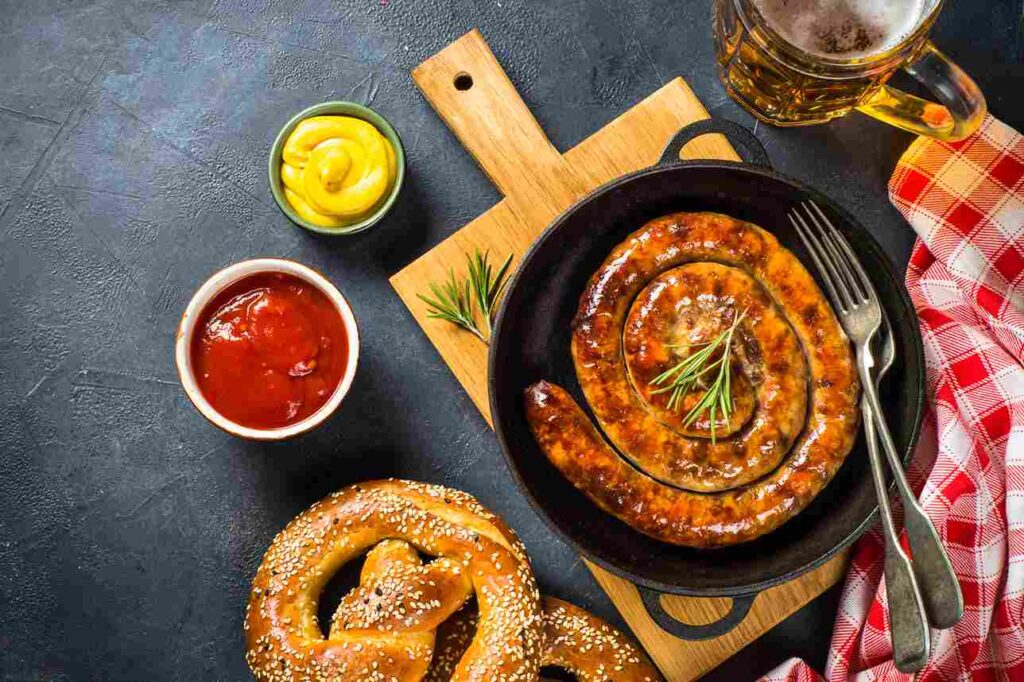
German Restaurants: A Journey into Authentic Cuisine
When you think of German restaurants, you probably imagine hearty meals, rich flavors, and, of course, a cold beer. But there’s so much more to these establishments. From rustic beer halls to sophisticated fine dining, German restaurants offer a unique experience for food lovers. Let’s dive into what makes these restaurants stand out and why they should be on your dining radar.
What Makes German Restaurants Unique?
German restaurants are famous for their comforting, hearty dishes. They are perfect places for those who enjoy rich, flavorful food made with fresh ingredients. Dishes like sauerbraten (pot roast), bratwurst (sausage), and knödel (dumplings) are staples in most German eateries. The key to these dishes lies in the way they are prepared — slow-cooked, spiced to perfection, and served with love.
But it’s not just about the food. German restaurants also pride themselves on their atmosphere. Whether it’s a cozy tavern or a bustling beer garden, these establishments create an inviting environment for everyone. From the warm wooden furniture to the rustic décor, dining in a German restaurant is as much about the experience as it is about the food.
Traditional Dishes You Can Expect in German Restaurants
If you’ve never been to a German restaurant, you might be wondering what to expect on the menu. Here are some of the most popular dishes that you’ll find:
- Sauerbraten: This is a tender pot roast, marinated in vinegar and spices for days, then slow-cooked until it’s melt-in-your-mouth delicious.
- Wiener Schnitzel: A classic dish made from breaded and fried veal or pork cutlets. It’s often served with a side of lingonberry jam and lemon wedges.
- Bratwurst: These sausages are a must-try. Grilled to perfection and usually served with sauerkraut and mustard.
- Kartoffelsalat: German potato salad, which is usually dressed in a tangy mustard-based sauce.
- Brezn (Pretzel): A soft, salty, and slightly chewy treat that pairs perfectly with a cold beer.
These dishes are just the beginning. German cuisine is diverse and varies by region. Whether you’re visiting a traditional Bavarian restaurant or one that specializes in Northern German fare, you’ll experience a variety of flavors that represent the best of Germany’s culinary heritage.
Why You Should Visit German Restaurants
Aside from the authentic food, there are a few other reasons why you should check out a German restaurant:
- Authenticity: When you dine at a German restaurant, you’re often getting a taste of traditional recipes that have been passed down through generations.
- Warm Ambience: German restaurants often have a friendly, relaxed vibe. It’s not just about the food, but about enjoying a fun meal with family and friends.
- Beer Selection: If you enjoy beer, then a German restaurant is the place to be. Many German eateries offer an extensive selection of beers, from lagers to wheat beers.
Pairing German Food with Beer
In German restaurants, beer isn’t just a drink; it’s an essential part of the dining experience. The country’s beer culture is deeply ingrained in its history, and the variety of beer available can be overwhelming. Popular types of beer you might find include:
- Pilsner: A pale lager that is crisp and slightly bitter.
- Weissbier (Wheat Beer): A cloudy beer with fruity and spicy notes, often paired with sausages.
- Bock: A stronger, darker beer that pairs well with rich meat dishes.
German beer isn’t just something you drink—it complements the food and enhances the overall experience.
Regional Specialties in German Restaurants
While there are some dishes common across Germany, many regions have their own specialties. For instance:
- Bavaria: Known for its pretzels, sausages, and hearty stews.
- Saxony: Famous for its rich, creamy potato soups and meat dishes.
- Berlin: Try currywurst, a local fast food staple of sausage with curry ketchup.
Each region offers something different, giving you the opportunity to explore new tastes and flavors every time you visit a German restaurant.
Dining Experience at German Restaurants
The dining experience at German restaurants is all about comfort, tradition, and a bit of fun. Whether you’re sitting in a cozy corner or enjoying the outdoors in a beer garden, the relaxed atmosphere is inviting for all. Traditional German music, lively conversation, and even Oktoberfest celebrations can make dining out feel like a celebration.
For those who enjoy a lively atmosphere, look for restaurants with live music or beer festivals. On the other hand, if you prefer a quieter meal, choose a more intimate venue that offers private booths and a relaxed environment.
How to Find the Best German Restaurants
Finding a great German restaurant depends on where you are located. In big cities like New York or Los Angeles, you’ll find top-notch German restaurants that specialize in authentic food and drink. However, even in smaller towns, many restaurants offer a taste of Germany.
Online reviews, food blogs, and even word-of-mouth recommendations are great ways to discover hidden gems. Look for places with a long history of serving traditional German food or restaurants that bring fresh takes on classic dishes. And don’t forget to ask the locals for their favorite spots—sometimes the best experiences are off the beaten path.
Exploring the Best German Restaurants in Your City
How to Find Authentic German Dining Spots
Discover where to find the most authentic German restaurants in your area.
The Experience of Dining in a Local German Restaurant
What to expect when you step into a local German eatery, from the ambiance to the menu.
A Beginner’s Guide to German Restaurant Menus
Understanding German Food Terminology
Learn common German food terms to help navigate restaurant menus with ease.
Key Dishes You’ll Find on Every German Menu
The essentials like sauerbraten, bratwurst, and more.
Why German Restaurants are Perfect for Group Dining
Large Portions and Shared Platters
Enjoy family-style meals that are perfect for sharing with a group.
The Festive Atmosphere of German Restaurants
How the lively environment makes these places ideal for gatherings.
How to Pair Wine with Your German Restaurant Meal
Best German Wines for Traditional Dishes
Pair wines like Riesling with sauerbraten or Gewürztraminer with schnitzel.
Why German Wine is the Perfect Complement to Beer
Explore the wine culture in German restaurants alongside beer selections.
The Role of Beer Gardens in German Restaurants
The Origins of German Beer Gardens
Understand the history behind these iconic outdoor spaces.
What to Expect at a German Beer Garden
A casual dining experience with great food, beer, and lively conversation.
Discovering Regional German Specialties at Local Restaurants
Bavarian Cuisine: A Taste of Southern Germany
Explore famous Bavarian dishes like pretzels, sausages, and hearty stews.
Northern German Cuisine: Light and Flavorful
Taste lighter dishes like fish and pickled herring from the northern regions.
How to Choose the Best German Restaurant for Your Taste
Rustic Taverns vs. Fine Dining Experiences
Should you go for a traditional tavern or an upscale German dining spot?
What to Look for in Quality German Cuisine
Tips for finding restaurants that offer authentic flavors and fresh ingredients.
The Best German Restaurant Desserts You Need to Try
Traditional German Sweets to Satisfy Your Sweet Tooth
From Apfelstrudel to Black Forest Cake, explore Germany’s sweetest creations.
Pairing Desserts with German Coffee or Beer
How to enjoy desserts with either a coffee or a special German beer.
A Look into Vegetarian Options at German Restaurants
Delicious Meat-Free German Dishes
From käsespätzle (cheese noodles) to sauerkraut, German restaurants have great vegetarian offerings.
Vegan Alternatives at German Eateries
How many restaurants cater to vegan diets with creative twists on traditional dishes.
The Best Times to Visit German Restaurants for a Special Meal
When to Enjoy Oktoberfest at German Restaurants
Find out when to visit for the ultimate Oktoberfest experience.
Seasonal Menus and Special Events at German Restaurants
Take advantage of seasonal dishes like weihnachtsgans (Christmas goose) during the holidays.
How German Restaurants Serve Traditional Holiday Feasts
Celebrating Christmas with Classic German Feasts
Traditional meals served at German restaurants for Christmas dinner.
Easter Celebrations: Festive Dishes You Can’t Miss
How Easter dinners at German restaurants showcase fresh seasonal dishes.
How to Enjoy a Traditional German Beer Tasting Experience
The German Beer Tasting Ritual
Learn the proper way to taste and enjoy German beer at a restaurant.
Best Food Pairings for Beer Tastings
The perfect dishes that go hand in hand with various types of German beer.
The History Behind German Restaurants and Their Cultural Significance
The Role of German Restaurants in Community Life
How these establishments bring people together and preserve cultural traditions.
The Evolution of German Dining Over the Years
Explore how German food culture has transformed into what we see today in restaurants.
Finding Family-Friendly German Restaurants for Your Kids
German Dishes Kids Will Love
Dishes like schnitzel and kartoffelsalat that are great for young eaters.
The Best Family Dining Atmosphere at German Restaurants
How many German restaurants cater to children with special menus and a welcoming environment.
Why German Restaurants Are the Best Place for Oktoberfest Celebrations
Enjoying Oktoberfest Outside of Germany
Find out how local German restaurants recreate the Oktoberfest atmosphere.
Traditional Food and Drinks During Oktoberfest
What to expect on the menu during Oktoberfest events at your local German restaurant.
Why German Restaurants Are Great for Special Occasions
Celebrating Milestones at German Eateries
German restaurants provide a warm and festive environment for celebrating birthdays, anniversaries, and other milestones. Many offer special menus for events, making your occasion extra memorable. The hearty food and welcoming atmosphere make every celebration feel significant.
How to Make the Most of a German Restaurant Brunch
Enjoying Traditional Brunch Dishes at German Restaurants
German brunch menus often include kaiserschmarrn (fluffy pancakes) and brotzeit (open-faced sandwiches). These dishes, paired with coffee or a light beer, are perfect for a relaxed start to the day. Visiting a German restaurant for brunch offers a cozy, hearty alternative to typical morning meals.
Discovering the Best German Beer Styles at Local Restaurants
A Guide to Beer Selection at German Restaurants
German beer styles are world-renowned, with lager, pilsner, and wheat beer leading the charge. Many German restaurants offer extensive beer lists with local and international options. By learning about the various beer styles, you can make better pairings with your meals.
The Rise of Modern German Restaurants and Their Contemporary Dishes
How German Cuisine is Evolving in Trendy Eateries
While traditional dishes remain at the heart of German restaurants, many have started experimenting with modern techniques. Contemporary German eateries blend international influences, creating fresh takes on classic foods. These restaurants give you a new perspective on Germany’s culinary heritage.
How to Enjoy a Traditional German Feast at Home
Bringing the German Restaurant Experience to Your Kitchen
If you can’t make it to a German restaurant, why not recreate the experience at home? Dishes like bratwurst, sauerbraten, and pretzels can be made with the right ingredients and a little time. Pair them with German beer to complete the meal and bring the authentic experience home.
Exploring German Street Food at Restaurants
Taste Authentic German Street Snacks in a Restaurant Setting
German restaurants that offer street food menus bring the best of local food culture indoors. Try snacks like currywurst, frikadellen (meatballs), or a warm pretzel to enjoy a casual, delicious meal. These dishes capture the vibrant, quick-paced essence of German street food.
Why German Restaurants Are Perfect for Beer Lovers
An Unmatched Selection of Beer to Pair with Your Meal
German restaurants offer a wide range of beer options that cater to all types of beer lovers. From light lagers to rich bocks, these establishments focus on showcasing authentic brews that complement traditional dishes. If you’re passionate about beer, German restaurants offer an unparalleled experience.
How to Experience German Food Culture through Regional Dishes
Sampling Regional Specialties at Local German Restaurants
Each region of Germany has distinct culinary traditions, and many German restaurants offer regional specialties. Whether it’s Bavarian sausages or Swabian noodles, these dishes reflect the unique flavors of their regions. Visiting different German restaurants lets you sample Germany’s culinary diversity.
The Importance of Authentic German Ingredients in Restaurants
Why Quality Ingredients Make German Dishes Stand Out
Authentic German restaurants focus on using high-quality, local ingredients for their dishes. Fresh sausages, sauerkraut, and locally-sourced meats elevate the flavors and make each meal memorable. Authentic ingredients help preserve the true taste of Germany’s culinary traditions.
A Look at German Restaurant Drink Menus Beyond Beer
Exploring Wines, Ciders, and Non-Alcoholic Options
While beer dominates the drink menu, German restaurants often feature a diverse selection of beverages. From Riesling wines to apfelwein (apple cider), there’s a drink to complement every dish. Non-alcoholic options like sparkling water and fruit juices are also available for those who prefer something lighter.
How to Celebrate Oktoberfest at Home Like a German Restaurant
Hosting Your Own Oktoberfest Feast at Home
If you can’t visit a German restaurant for Oktoberfest, bring the celebration to your own home. You can create the same atmosphere with traditional sauerkraut, pretzels, and beer served in steins. Host a lively gathering with music, food, and fun to emulate the festival spirit.
Exploring German Vegan Options in Restaurants
Plant-Based Dishes You Can Enjoy at a German Restaurant
As the demand for vegan options grows, many German restaurants are now offering plant-based dishes. From hearty vegetable stews to vegan schnitzel, these restaurants are evolving to cater to a wider audience. You’ll find that German vegan food offers robust flavors and satisfying textures.
How to Host a German-Themed Dinner Party at Home
Bringing the Flavors of German Restaurants to Your Dinner Table
Hosting a German-themed dinner at home is easier than you think. Serve traditional dishes like sauerbraten, bratwurst, and apfelstrudel, and pair them with the perfect German beer. A festive table setting with candles and German music can help set the mood for a memorable evening.
Why German Restaurants Are a Great Option for Solo Diners
Enjoying a Relaxing Meal at a German Restaurant Alone
Dining alone at a German restaurant is a delightful experience, with cozy seating and a welcoming atmosphere. You can take your time enjoying a hearty meal and sip on a craft beer. Many German restaurants also offer counter seating for solo diners who want a more interactive dining experience.
How to Make Your German Restaurant Visit Kid-Friendly
Family-Friendly Menus and Activities for Children
German restaurants are perfect for families, with kid-friendly dishes and activities to keep children entertained. Many offer smaller portions of traditional dishes like bratwurst or schnitzel. Some restaurants even have play areas or activity sheets to keep young ones busy while you enjoy your meal.


